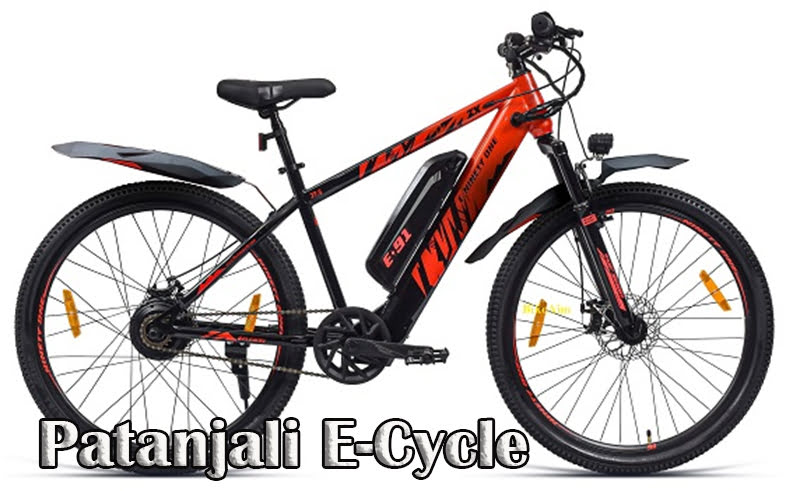Okay, here’s the thing. I don’t know about you, but when I first saw those rumors about Patanjali releasing an e-cycle priced at ₹5,000 with an 80-kilometer range, my inner tech geek nearly had a meltdown. I mean, can you imagine? An affordable e-cycle with decent range—something that could change the game for everyday commuters? In India? I was ready to cancel my gym membership and ride that beauty all over the city.
Patanjali E-Cycle
By now, you’ve probably stumbled across that *too-good-to-be-true* headline: “Patanjali’s ₹5,000 Electric Cycle with 80 km Range.” Sounds like a dream come true, right? Cheap electric cycles flooding the market—*finally*, something that aligns with the dream of affordable, eco-friendly transportation in India. But… there’s a catch. Actually, multiple catches. Buckle up, folks, this one’s a deep dive into the world of viral misinformation.
Also Check:- Hero Lectro H5 Electric Cycle
The Claims: A Rollercoaster of Unrealistic Promises
So, what’s the buzz? Multiple websites and social media accounts are reporting that Patanjali, yes the Ayurvedic giant, is about to revolutionize the electric vehicle (EV) market with an e-cycle priced at just ₹5,000. That’s right—₹5,000. Not ₹50,000, not ₹10,000—₹5,000. And as if that wasn’t enough to grab attention, these reports claim the e-cycle would cover a whopping 80 kilometers on a single charge. I’m sorry, but where do I sign up for this miracle of science and engineering?
According to these rumors, the specs are downright enticing: a 250W brushless DC motor, an 8.8Ah lithium-ion battery, a 25 km/h top speed, and a charging time of 4-6 hours. *And*, apparently, Baba Ramdev himself gave the green light on this during a grand event in Haridwar. Sure, why not? Oh, and let’s not forget the delivery timelines and pre-booking info—because *that* makes everything sound so real.
Fact-Check: Are We Getting Fooled?
Before you start packing your bags for the Haridwar launch event, let’s hit the brakes. I dug around and found some… well, interesting stuff. Here’s the thing: after scanning Patanjali’s official website, their verified social media accounts, and browsing through actual press releases, there’s no mention of any electric cycles. Not a single one. Nada. Zip. Zilch. In fact, even established automotive journalists haven’t touched this story with a ten-foot pole. So, where is this info coming from?
Honestly, this feels a lot like deja vu. Remember those earlier rumors about Patanjali launching a 5G smartphone at rock-bottom prices? Yeah, that went nowhere too. Same pattern. The thing is, whenever these kinds of headlines pop up, it’s hard not to get excited. But excitement doesn’t equal truth—at least, not in this case.
Also Check:- Hero Xtreme 160R Bike
The Skeptical Side of Things
Let’s talk numbers. An 80-kilometer range for a ₹5,000 e-cycle sounds almost comical when you really start thinking about it. To put it in perspective, the average electric cycle on the market today in India is priced between ₹25,000 to ₹80,000. And even then, most of them are struggling to hit that range, with battery costs eating up a big chunk of the price. So how is Patanjali allegedly pulling this off? Well, it doesn’t add up.
Some reports hint at using recycled battery cells and a direct-to-consumer sales model to keep costs down. Cool idea, right? But implementing that would require a massive, verified infrastructure, partnerships with suppliers, and, oh, a ton of research and development that’s nowhere to be found. If Patanjali were genuinely making waves in the electric cycle market, industry experts would have *definitely* heard about it by now. But no one’s talking about it.
The Real Question: Why Are We Buying Into This?
The fact that these rumors have gone viral says a lot about what we want as consumers. Affordable electric mobility is a big deal in India. It’s not just about saving money—it’s about sustainability, reducing pollution, and giving a boost to local manufacturers. Patanjali’s brand is already synonymous with the “Swadeshi” (self-reliant) movement, so it’s no surprise that people are jumping on this news. Who wouldn’t want to support a homegrown solution to the electric mobility revolution?
But here’s the kicker: just because we *want* something to be true doesn’t make it true. We live in an age where excitement often overrides caution, and viral headlines stir up emotions faster than reason. But what we *really* need is solid information. The electric cycle market in India has genuine potential, but we’re not going to get there by chasing rumors.
Also Check:- Bajaj Chetak 3503 Electric Scooter
Industry Experts Speak Out
It’s no surprise that automotive analysts are skeptical. And I can’t blame them. According to experts, an 80-kilometer range, advanced features, and a ₹5,000 price tag would require some groundbreaking technological advancements—stuff that we haven’t seen in this industry yet. Battery technology alone would eat up most of that ₹5,000 cost. So unless Patanjali has figured out some secret sauce that the rest of the industry is missing (which, let’s face it, is highly unlikely), this is simply not feasible.
The Verdict: Proceed With Caution
So, what’s the final takeaway here? Well, the claims about a ₹5,000 Patanjali electric cycle with an 80-kilometer range are, at best, speculative—and, at worst, just flat-out fake news. No credible source has backed up these stories, and there’s no sign of Patanjali announcing such a product. Sure, it’d be great if it were true—who wouldn’t love a bargain e-cycle with a massive range? But until there’s hard evidence, you’d be wise to treat these claims with a large pinch of salt.
